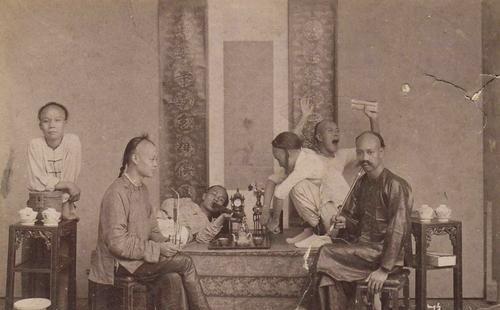In 1862, in Qingpu, Shanghai, guns roared endlessly, and the air was filled with a pungent sulfur smell. The cold wind blew, and the unquenchable flames of war on the side of the road swayed left and right, as if they had not yet shaken off the shadow of the vicious fight between the Fang Cai Taiping Army and the Huaer Yang Gun Team.
The leader of the Yankees, Wahl, was shot five times, the deputy commander Forrest was captured alive, and the Yankees were killed and wounded by one-third, and had to retreat. The more the "foreigners" who had suffered losses thought about it, the more they felt that they were in a nest, and they went to Li Hongzhang in a huff and asked him to give an explanation to the foreign gun team.

In order to appease the foreign gun brigade, Li Hongzhang ordered his men to redeem the captured foreigners no matter how much money they spent. In the end, Li Hongzhang paid the Taiping Army 1 million rounds of ammunition, hundreds of firearms, and 10 boxes of fine opium, which was exchanged for Forrest.
Extorting money is enough, why do you want opium? Did the Taiping Army become addicts? Of course, the Taiping Army, which had been fighting for many years, could not all be addicts, and the reason why they demanded opium was because opium was a hard currency at that time.
After the defeat of the First Opium War, a large number of opium poured into China, and the "opium fever" arose among the people. Whether it is a wealthy businessman or a small people in Shengdou, they all rush to buy opium, which is not just a desire for appetite, but opium has financial attributes and can give people an unlimited and convenient payment experience.
Before the arrival of opium, the traveling caravans often had to carry heavy silver boxes, and often became a fat sheep in the eyes of bandits because their luggage was too conspicuous. Now they can easily trade with just a handful of opium, reducing their risk of being robbed by Lu Fu. As a result, opium quickly gained people's favor, and some people who went to Beijing to take the exam also used opium to pay for food and accommodation.
The Qing government initially tried to ban opium, but later found that the more it was banned, the more it was simply lying flat and dying—instead of vigorously banning smoking, it was better to rely on opium to collect taxes and subsidize the overstretched national treasury. Therefore, under the banner of "substituting levies for prohibitions," the Qing government levied an opium tax on the whole country.
In the beginning, the Qing government mainly collected "opium lijin" at the time of customs clearance of goods, and after tasting the sweetness, simply legalized the sale of opium, and also developed the names of foreign medicine lijin, local medicine lijin, local medicine tax, and poppy mu tax. Therefore, in the thirty-fourth year of Guangxu (1908), of the 279.92 million taels of silver in the annual fiscal revenue of the Qing government, 33.02 million taels were contributed by the tax of foreign medicines.
Tempted by high taxes, the Qing government was no longer willing to ban smoking. Although the Qing government originally also collected opium taxes, opium was mainly imported, and most of them were earned by foreigners. The Qing government, whose appetite had grown larger, made a clever move and simply opened up opium cultivation.
After the opium was produced and sold, the effect was immediate. In the 1870s, opium imports remained almost at more than 60,000 quintals per year, and in 1879 they were as high as 80,000 quintals. After domestic opium entered the market, it immediately used the advantage of low prices to frantically encroach on market share, and sales increased by 10 times in just a few years, directly leading to a sharp decline in the number of imported opium, leaving behind the legend of "local medicine" defeating "foreign medicine".
Because opium was lucrative, the people of Sichuan changed their cultivated land to opium, and by 1906, the area under opium cultivation accounted for about 16.4% of the province's cultivated land. Since then, the scale of opium cultivation has been continuously expanded, and there are almost no opium planters in more than 140 prefectures and counties in Sichuan, except for a few side halls."
At the same time, more and more opium smokers. In Sichuan, the proportion of men and women who smoke opium in the cities is 50 per cent and 20 per cent, respectively, while the proportion of men and women who smoke opium in rural areas is 15 per cent and 5 per cent, respectively. The markets around eastern Sichuan are full of opium except for tung oil. Looking across the country, people are skinny and skinny under the scourge of opium, and they are ridiculed as "the sick man of East Asia".
The crazy opium trade, while encroaching on a large amount of arable land, destroyed people's spirit and flesh, and even made people completely lose their labor force, so that they gave birth to the Ding Pengqi Famine that swept the world, and also destroyed the late Qing Dynasty, so that the Qing Dynasty came to an end in a completely sick environment.